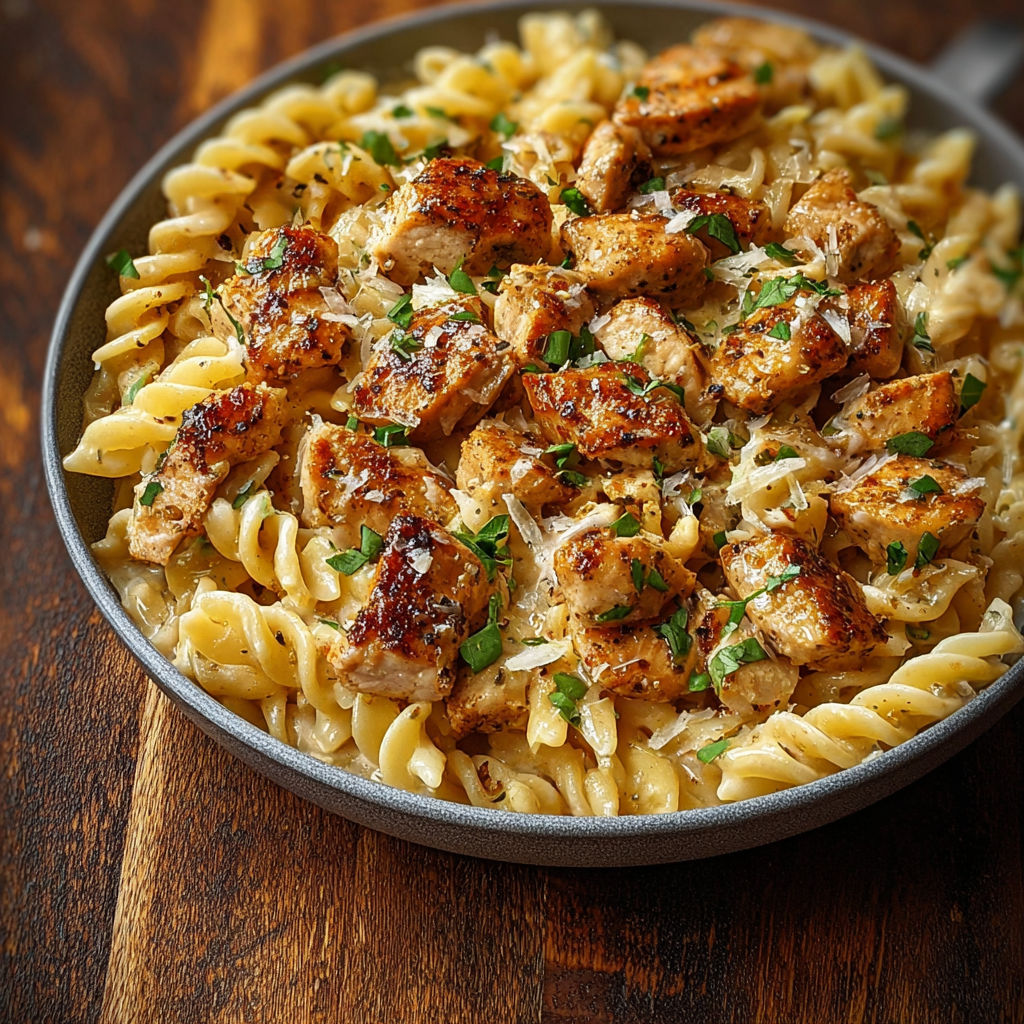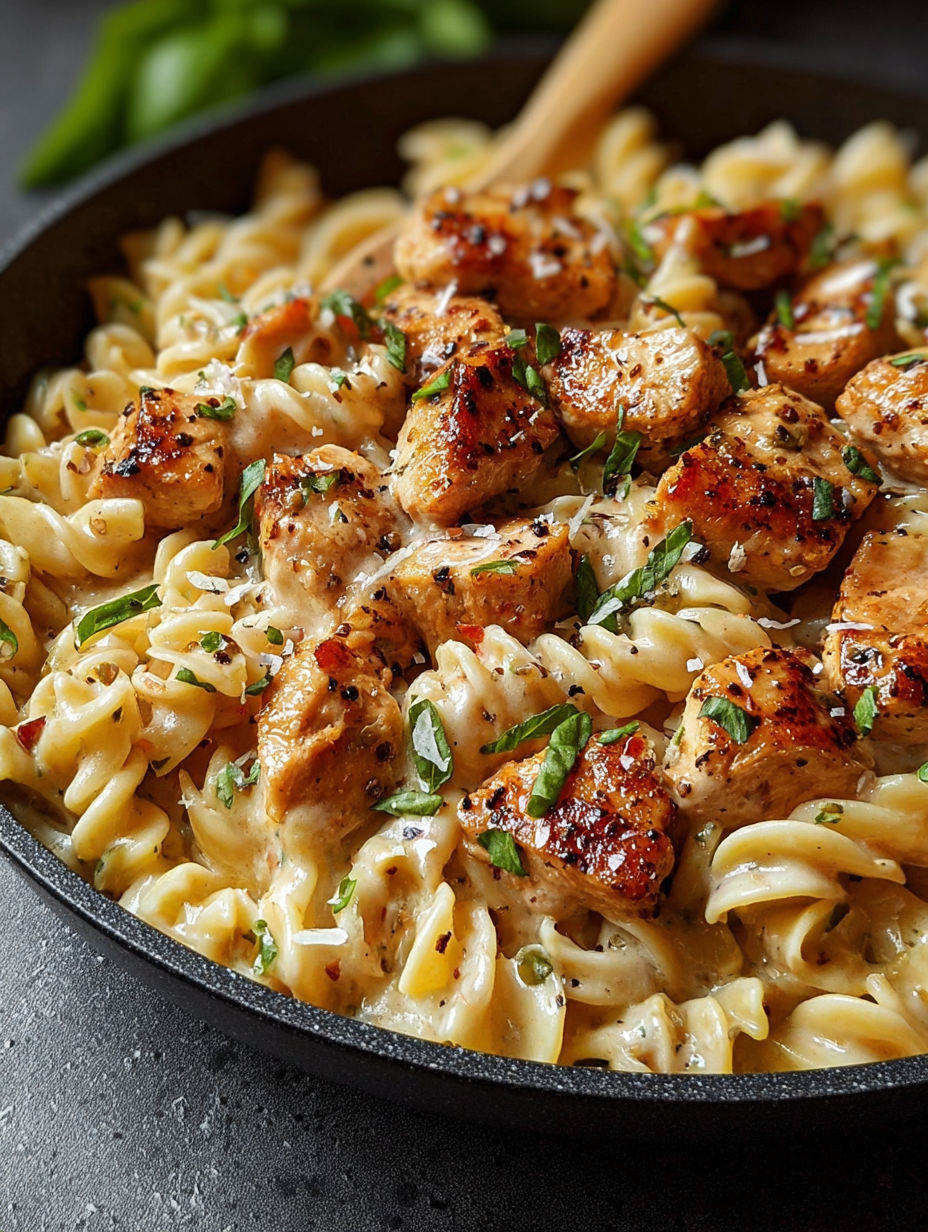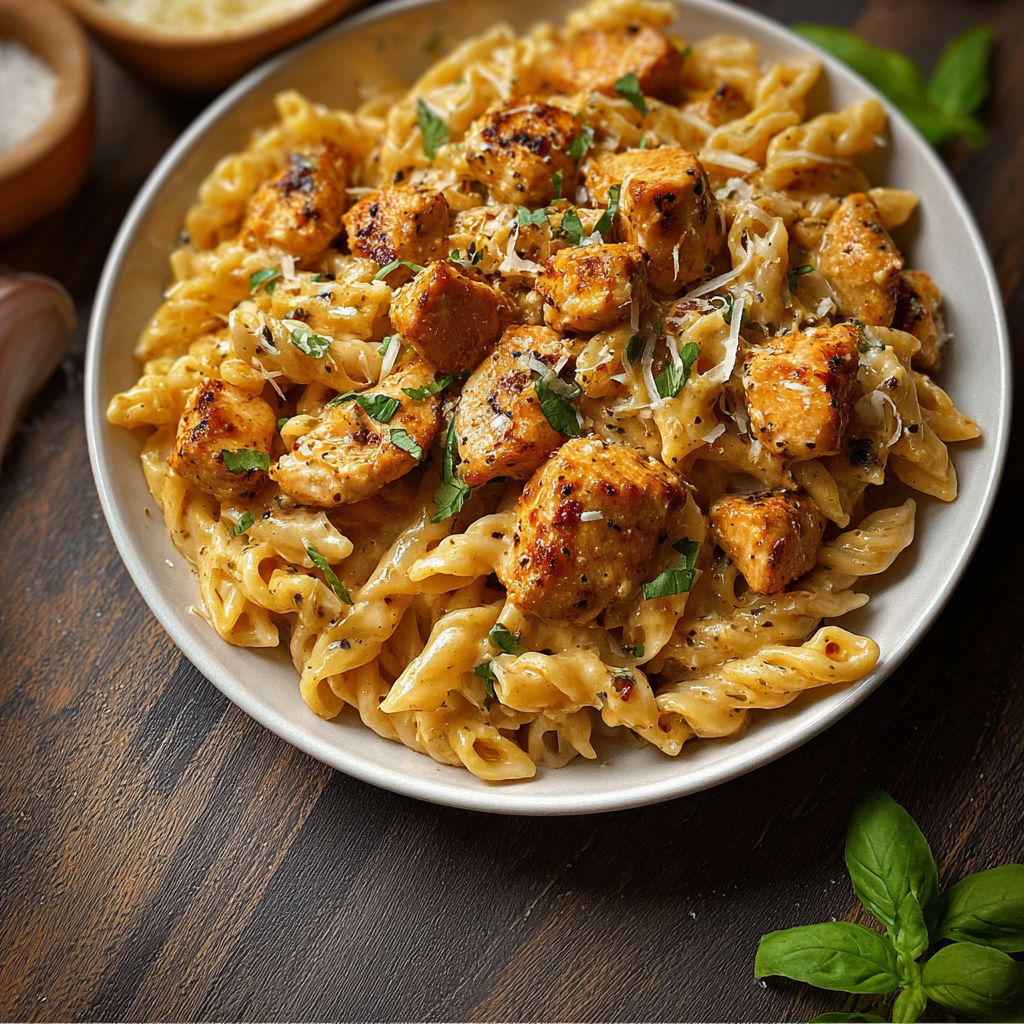 Pin
Pin
This creamy, comforting Garlic Butter Chicken Parmesan Pasta transforms basic ingredients into a restaurant-worthy meal that's perfect for busy weeknights. The combination of tender chicken chunks bathed in a rich garlic Parmesan cream sauce has made this dish a guaranteed crowd-pleaser in my home.
I created this recipe when my Italian mother-in-law was visiting and needed to impress her with my cooking skills. She asked for the recipe before leaving, which might be my greatest culinary achievement to date.
Ingredients
- Chicken breast cubes ensure tender bites that cook quickly and absorb the garlic butter flavor beautifully. Look for plump pink breasts without discoloration.
- Penne or rotini pasta creates the perfect vehicle for capturing the creamy sauce in all their ridges and hollows. Choose a high quality pasta that holds its shape.
- Unsalted butter forms the rich base for our sauce. Using unsalted allows you to control the final seasoning.
- Heavy cream provides that luxurious texture that makes this dish restaurant quality. The higher fat content prevents curdling.
- Parmesan cheese should be freshly grated for optimal melting. Avoid pre-shredded versions with anti-caking agents.
- Fresh garlic cloves deliver aromatic punch that dried versions simply cannot match. Look for firm bulbs without sprouting.
- Fresh basil leaves add a bright finishing note that cuts through the richness of the cream sauce.
How To Make Garlic Butter Chicken Parmesan Pasta
- Cook the pasta
- Bring a large pot of water to a rolling boil and add a generous amount of salt until it tastes like seawater. This properly seasons your pasta from within. Add your penne or rotini and cook until just al dente according to package directions. Be careful not to overcook as the pasta will continue cooking slightly when added to the hot sauce. Reserve a cup of pasta water before draining in case you need to adjust sauce consistency later.
- Create the garlic butter base
- In a large skillet over medium heat, melt the butter until it begins to foam but not brown. Add the minced garlic and sauté for exactly one minute, stirring constantly to prevent burning. The garlic should become fragrant and just barely golden. This step infuses the butter with garlic flavor which forms the foundation of our sauce.
- Cook the chicken
- Add the cubed chicken to the garlic butter and spread in an even layer. Let cook undisturbed for 2 minutes to develop a golden crust before stirring. Continue cooking and occasionally stirring for another 4-6 minutes until the chicken is cooked through with no pink remaining. The chicken should register 165°F on an instant-read thermometer.
- Develop the cream sauce
- Pour in the heavy cream and bring to a gentle simmer. Add the freshly grated Parmesan cheese in small handfuls, stirring continuously to ensure it melts smoothly into the sauce without clumping. Continue simmering and stirring until the sauce coats the back of a spoon, about 3-4 minutes. Season carefully with salt and freshly ground black pepper, tasting as you go.
- Combine and finish
- Add the drained pasta directly to the skillet with the chicken and sauce. Gently fold everything together using tongs or a wooden spoon until every piece of pasta is gloriously coated with the creamy garlic sauce. If the sauce seems too thick, add a splash of the reserved pasta water to achieve the perfect consistency. Remove from heat and immediately transfer to warmed serving plates. Garnish generously with torn fresh basil leaves.
The heavy cream is truly the secret weapon in this recipe. I once tried substituting half and half to save calories, and while still delicious, it lacked that velvety restaurant quality texture that makes everyone go back for seconds. My husband still reminds me of this culinary misstep years later.
Storage Solutions
This Garlic Butter Chicken Parmesan Pasta stores reasonably well in an airtight container in the refrigerator for up to 3 days. The sauce will thicken considerably when cold. When reheating, add a splash of cream or milk and warm gently over low heat, stirring frequently to prevent separation. Alternatively, microwave at 50% power in 30-second intervals, stirring between each until heated through. Freezing is not recommended as the cream sauce will likely separate upon thawing.

Ingredient Swaps
If you need to make substitutions, this recipe offers several flexible options. Boneless chicken thighs can replace chicken breast for more flavor and moisture. For a vegetarian version, substitute sautéed mushrooms or broccoli florets. The pasta type is completely interchangeable based on preference, with farfalle and fusilli being excellent alternatives that hold the sauce well. For a lighter version, whole milk can substitute for some of the heavy cream, though the sauce will be less rich. Fresh oregano or thyme can stand in for basil if needed.
Serving Suggestions
This creamy pasta pairs beautifully with a bright, acidic side to balance the richness. A simple arugula salad with lemon vinaigrette cuts through the creaminess perfectly. For a complete meal, serve alongside roasted asparagus or broccolini with a squeeze of lemon. Crusty garlic bread is almost mandatory for sopping up every last drop of the magnificent sauce. A chilled glass of Pinot Grigio or light Chardonnay complements the flavors exceptionally well.

Recipe FAQs
- → Can I use different pasta shapes for this dish?
Absolutely! While the recipe suggests penne or rotini, any medium-sized pasta works well. Farfalle (bow ties), fusilli, or even fettuccine can be excellent alternatives. The key is choosing a shape that will hold the creamy sauce effectively.
- → How can I make this dish lighter?
To create a lighter version, substitute half-and-half for heavy cream and reduce the butter by half. You can also use part-skim mozzarella along with less Parmesan. Consider adding more vegetables like spinach, cherry tomatoes, or zucchini to increase nutrients while maintaining flavor.
- → Can I prepare any components ahead of time?
Yes! Cook and cube the chicken up to two days ahead and store in the refrigerator. You can also prepare the pasta in advance, toss it with a little olive oil to prevent sticking, and refrigerate. When ready to serve, simply make the sauce and combine all components - this cuts preparation time significantly.
- → What's the best way to reheat leftovers?
Reheat gently on the stovetop over medium-low heat with a splash of milk or cream to revitalize the sauce. Stir frequently to prevent sticking and burning. Microwave reheating works too - cover with a damp paper towel and heat in 30-second intervals, stirring between each until warmed through.
- → What sides pair well with this pasta dish?
A simple green salad with vinaigrette dressing provides refreshing contrast to the rich pasta. Garlic bread or a crusty baguette works perfectly for mopping up extra sauce. Roasted vegetables like asparagus, broccoli, or Brussels sprouts also complement the creamy flavors beautifully.
- → Can I freeze this dish?
While possible, cream-based pasta dishes don't freeze ideally as the sauce may separate when thawed. If freezing, do so before adding the pasta - freeze the chicken in sauce separately, then prepare fresh pasta when reheating. For best results, consume frozen portions within 1-2 months.
